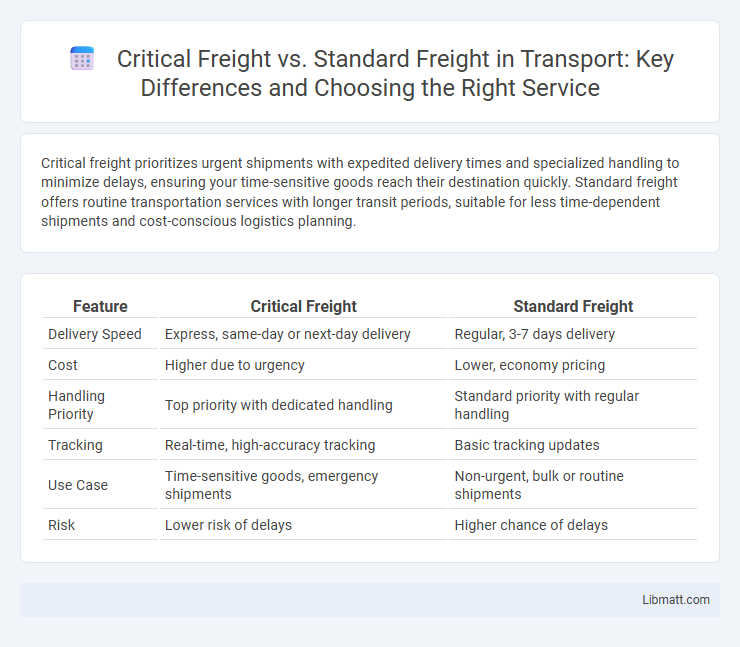Critical freight prioritizes urgent shipments with expedited delivery times and specialized handling to minimize delays, ensuring your time-sensitive goods reach their destination quickly. Standard freight offers routine transportation services with longer transit periods, suitable for less time-dependent shipments and cost-conscious logistics planning.
Table of Comparison
| Feature | Critical Freight | Standard Freight |
|---|---|---|
| Delivery Speed | Express, same-day or next-day delivery | Regular, 3-7 days delivery |
| Cost | Higher due to urgency | Lower, economy pricing |
| Handling Priority | Top priority with dedicated handling | Standard priority with regular handling |
| Tracking | Real-time, high-accuracy tracking | Basic tracking updates |
| Use Case | Time-sensitive goods, emergency shipments | Non-urgent, bulk or routine shipments |
| Risk | Lower risk of delays | Higher chance of delays |
Understanding Critical Freight vs Standard Freight
Critical freight involves urgent shipments requiring expedited handling and delivery, often within hours or a day, to prevent costly delays in supply chain operations. Standard freight follows regular transit schedules with longer delivery times, typically ranging from several days to weeks, suitable for non-urgent shipments. Companies optimize logistics by choosing critical freight for time-sensitive goods and standard freight for cost-effective transport when speed is less crucial.
Key Differences Between Critical Freight and Standard Freight
Critical freight involves expedited shipping for time-sensitive, high-priority goods requiring immediate delivery, often utilizing dedicated transportation and special handling to ensure speed and security. Standard freight follows regular shipping schedules with longer transit times, suitable for less urgent shipments and typically involving consolidated loads to reduce costs. Understanding these key differences helps you choose the right freight service based on urgency, cost, and delivery requirements.
When to Choose Critical Freight Services
Critical freight services are ideal when urgent delivery is essential to avoid operational downtime or meet tight deadlines, such as shipping perishable goods or crucial manufacturing components. Standard freight suits non-urgent shipments where cost efficiency and routine delivery schedules are priorities. Choosing critical freight ensures your shipment arrives swiftly and reliably, minimizing risks associated with delays.
Cost Implications: Critical vs Standard Freight
Critical freight typically incurs higher costs due to expedited shipping methods and priority handling, which demand more resources and faster transit times. Standard freight offers more economical rates by using regular schedules and less urgent delivery, making it optimal for non-time-sensitive shipments. Your choice between the two directly impacts budget allocation and delivery speed, balancing cost efficiency with urgency.
Speed and Delivery Timeframes Compared
Critical freight prioritizes urgent shipments with expedited transit times, often guaranteeing delivery within hours or the same day, making it ideal for time-sensitive cargo. Standard freight operates on regular schedules with longer delivery windows, typically ranging from several days to weeks depending on distance and service level. Choosing critical freight ensures your shipment arrives faster, significantly reducing downtime and meeting tight deadlines.
Risk Factors in Critical and Standard Freight
Critical freight involves high-value, time-sensitive shipments with elevated risks including delays, damage, or loss due to expedited handling and stringent delivery windows. Standard freight faces lower risk factors with flexible transit times, allowing for routine handling and less immediate pressure, which reduces the probability of costly disruptions. Understanding these risk dynamics helps logistics providers tailor insurance, packaging, and tracking solutions to optimize shipment security and efficiency.
Industries That Rely on Critical Freight Services
Industries such as healthcare, aerospace, electronics, and manufacturing depend heavily on critical freight services to ensure timely delivery of essential components and materials. Critical freight solutions support urgent shipment needs, minimizing downtime and preventing costly production delays. Your business can maintain operational efficiency and meet tight deadlines by utilizing specialized carriers experienced in handling time-sensitive freight.
Tracking and Monitoring: Critical vs Standard Freight
Critical freight shipments offer real-time tracking and continuous monitoring through advanced GPS and IoT technologies, ensuring immediate updates on location and condition. Standard freight typically provides less frequent tracking, with updates occurring at set checkpoints rather than continuously. Your ability to respond promptly to delays or issues is significantly enhanced with critical freight's superior monitoring capabilities.
Choosing the Right Freight Option for Your Business
Choosing the right freight option hinges on your delivery timeline and cost considerations, with critical freight offering expedited shipping for time-sensitive shipments. Standard freight suits non-urgent goods, providing cost-effective solutions through regular transit schedules. Evaluating shipment urgency, budget, and inventory needs ensures the optimal balance between speed and expense for your business logistics.
Future Trends in Freight: Critical and Standard Services
Future trends in freight highlight increasing reliance on critical freight services driven by just-in-time manufacturing and e-commerce demands for faster delivery times. Advanced tracking technologies and AI-powered logistics optimize both critical and standard freight by enhancing route efficiency and reducing transit delays. Standard freight continues to evolve with sustainability initiatives, incorporating electric vehicles and greener packaging to meet environmental regulations.
critical freight vs standard freight Infographic

 libmatt.com
libmatt.com